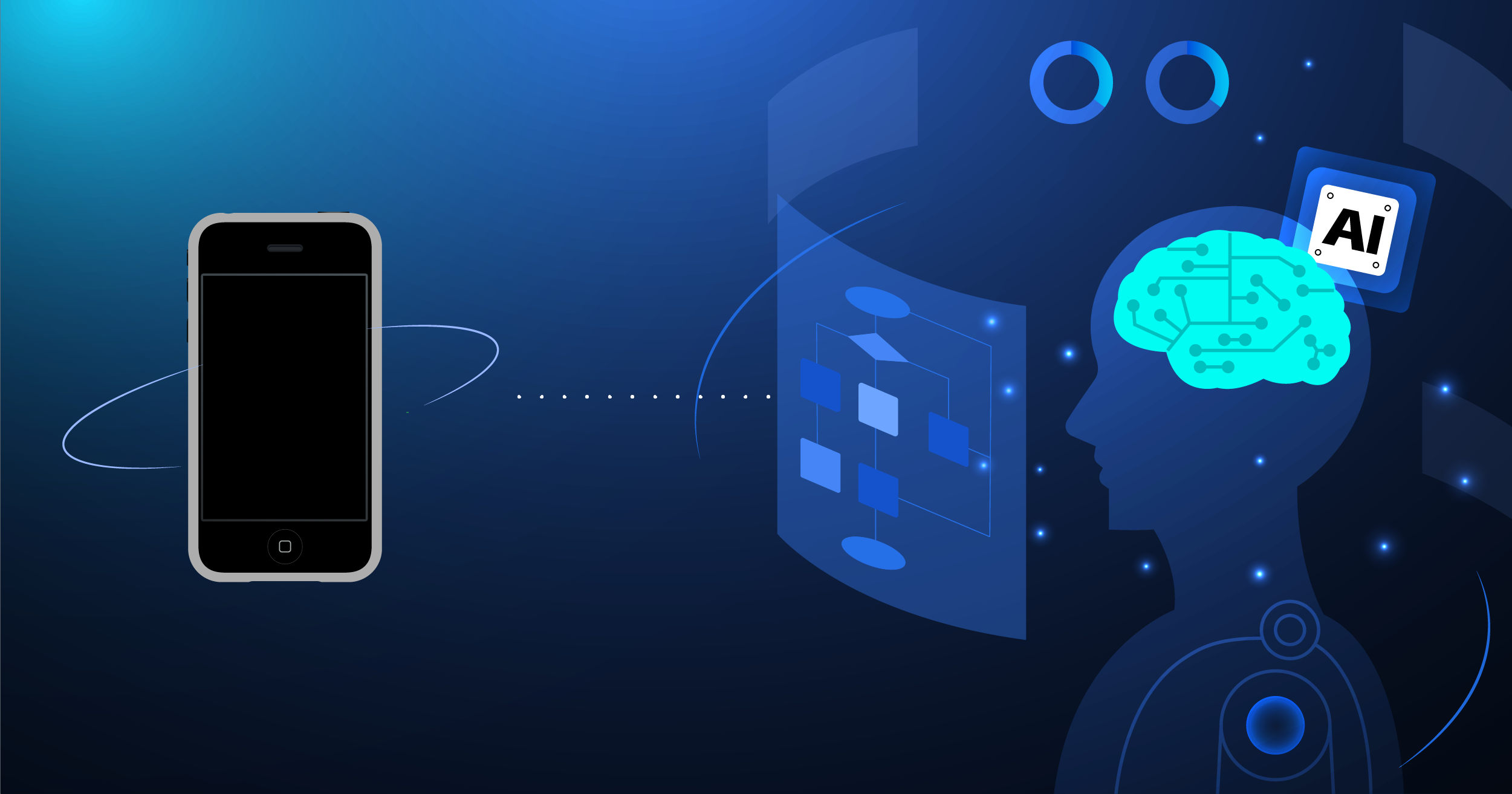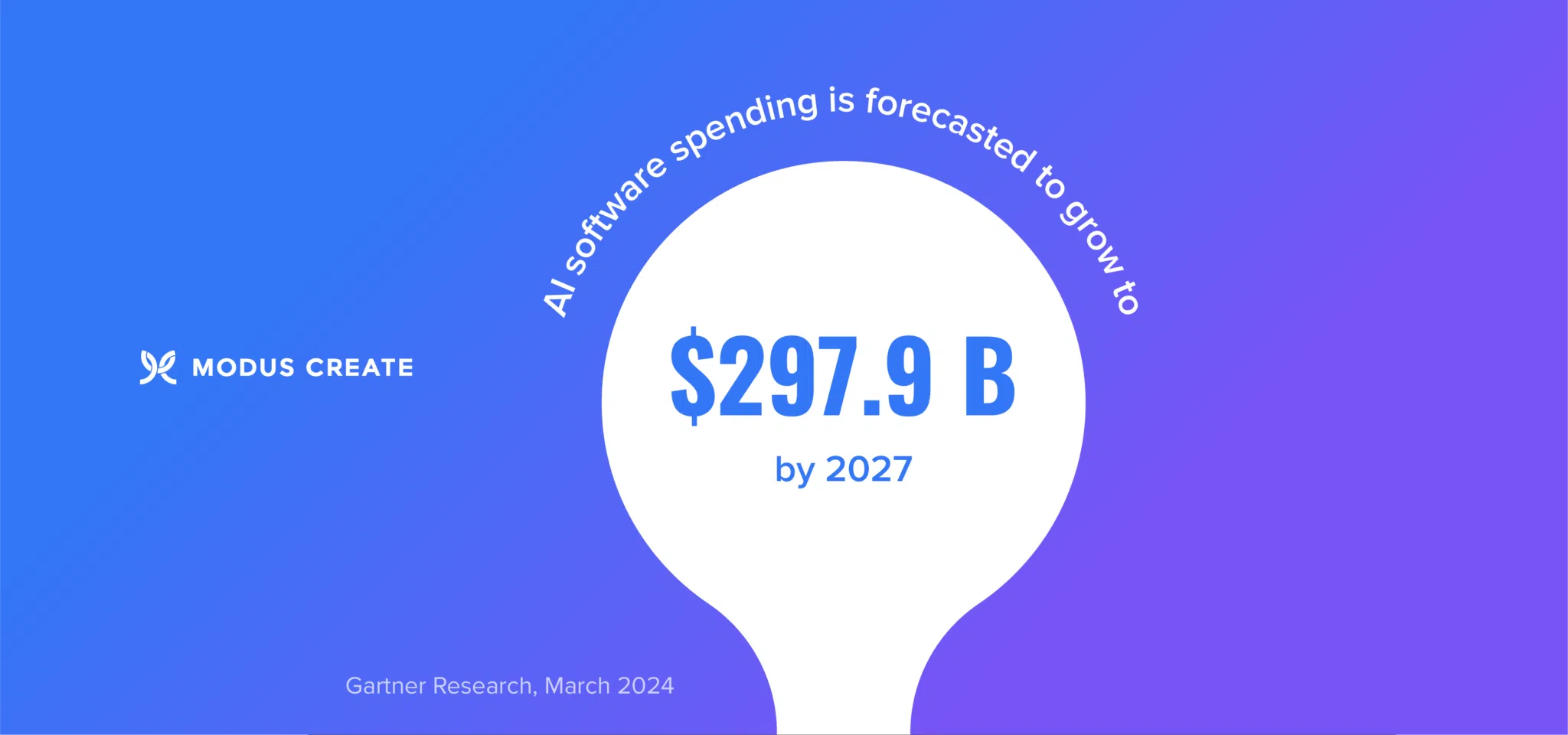From iPhone to AI: How lessons from the mobile boom can help navigate the new era of software development


Table of contents
Subscribe via Email
Subscribe to our blog to get insights sent directly to your inbox.
“We’re going to make some history together today.”
This bold prediction from 2007, when Steve Jobs introduced the first iPhone seems almost understated in hindsight. Within a week of the launch, Apple sold 1 million iPhones.
Today, Apple's phone is used daily by over a billion people. The smartphone has become one of the most transformative technologies ever invented, considering its vast impact across the planet.
The question now is: What can the mobile revolution teach us about AI’s transformative power?
The parallels between the mobile technology and AI eras are striking for those of us involved in enterprise technology and the startup ecosystem. Like the mobile boom, the AI revolution presents new opportunities for digital transformation in enterprises of any size.
Riding high in the mobile boom
When I co-founded Modus Create 15 years ago, our firm rode the digital transformation wave sparked by the mobile computing explosion. We grew from three employees to more than 400 across 65 countries. Today, we help enterprise clients in diverse sectors like manufacturing, retail, life sciences, and healthcare transform into digital product companies where technology drives their core value.
The confluence of three key factors combined to create a fertile ground for digital transformation consulting companies like Modus Create to take root and thrive:
1. A new era of mobile computing
The iPhone opened a vast app market, setting high design and user experience standards.
Now home to over 1.8 million applications, the App Store allowed growing enterprises to distribute and monetize their apps without traditional channels. The iPhone spawned its own economy. It created millions of jobs, transforming how work gets done in retail, banking, life sciences, healthcare, and virtually every other industry.
2. Cross-platform development
With iOS and Android, open-source JavaScript frameworks like React Native and Ionic enabled quicker, cost-effective app development. Robust APIs allowed product development companies like Modus to leverage device features without starting from scratch.
3. Lean startup methodology
This approach encouraged rapid prototyping and testing, allowing companies to validate and refine ideas quickly with minimal viable products.
The AI era: A new ecosystem with new opportunities
The market potential of the AI era of digital transformation is staggering. AI product spending is forecasted to grow to $297.9 billion by 2027.
As we saw in the mobile era, three factors are proving pivotal for companies looking to AI to transform their digital strategy:
1. Advanced hardware available to AI-driven enterprises
The emergence of advanced GPUs and specialized hardware for AI tasks has significantly reduced the time and cost of training models. As these advanced hardware components become more widespread, their costs have decreased. Startups and smaller enterprises can now afford powerful computing resources that were previously the province of large corporations.
2. Data-centric product development
The focus is shifting from model-centric to data-centric product development, with new frameworks emerging that prioritize data quality. This is essential for building robust AI solutions.
The combination of 5G and edge computing enables product developers to create apps that leverage real-time data analytics that can personalize customer experience or perform predictive maintenance. But, to make this possible, organizations must have a consistent process for gathering, disseminating, and interpreting data.
3. Condensed software development life cycles
AI automates many routine tasks. This simplifies the product development process for startup and enterprise IT departments alike. Many businesses are looking at how to use existing AI tools to increase productivity rather than build their own models.
For example, enterprises will use AI pair programmers like GitHub Copilot, AI-workflow experts like Atlassian Intelligence, and roll out guidelines for using language models.

Just as with mobile computing, AI-driven digital transformation allows companies of all sizes to innovate more efficiently and bring solutions to market faster. To thrive in this new era, enterprise IT leaders should promote AI fluency across their organizations so employees understand AI’s potential and limitations. At the same time, it pays to watch for new players in the startup ecosystem who can advance your AI progress with niche capabilities.
Keys to success in the AI era
As a startup co-founder who works with many large enterprise clients, let me offer a few suggestions for seizing AI's enormous strategic potential.
1. Look for specific problems where AI can deliver
In financial services, for example, firms are applying AI to fraud detection and risk management and seeing impressive results. Visa, the payments company, reports its use of GenAI to identify and predict fraudulent activity prevented $40 billion in fraud from October 2022 to September 2023. That is double the amount of the previous year.
In life sciences, companies like EVERSANA are using AI to speed up the MLR review process, saving time while enhancing the accuracy of the review process for team members.
The bottom line: Start with high-impact, measurable areas that can address business challenges.
2. Collaborate and partner with AI strategy consultants
Many companies lack the in-house expertise to implement AI projects. That’s why it’s essential to find the right AI strategy consulting partners.
At Modus, our roots are in the open source world. And we built our reputation and relationships early on by being active, visible, and relevant in the open source communities for JavaScript and other open technologies.
In the AI era, we’re putting similar energy into deepening our commercial partnerships with AWS, Azure, Google Cloud, and leading ISVs who have AI capabilities we can tap into to build robust, scalable, secure solutions for clients.
For enterprise IT leaders seeking to ramp up their AI strategy, don’t underestimate the power of a great consulting partnership. And don’t overlook the niche skills found in the startup ecosystem.
3. Put AI front and center of your organization
AI presents an opportunity to bring fresh thinking to how you manage work across your operations. We’ve started to do this at Modus and will accelerate down this path in 2025.
For example, there are opportunities across our company to re-think how we can automate complex tasks like HR onboarding or creating legal contracts. The cost savings generated from these productivity gains can be funneled back into hiring top talent to strengthen the business.
Prioritize what makes sense for your business. As I’ve said, any strategy for digital transformation should go hand-in-hand with a thoughtful approach to organizational design. And the most successful companies will structure work to cultivate innovation, enable their people to perform at their creative best, and be intentional about applying AI to their digital strategy so it delivers tangible business outcomes.
The AI era allows companies of all sizes to innovate more efficiently and bring solutions to market faster. To thrive in this new era, enterprise IT leaders should promote AI fluency across their organizations so employees understand AI’s potential and limitations.
Just as the iPhone sparked a digital transformation revolution over a decade ago, the AI era promises to disrupt every industry. GenAI is accelerating just as rapidly as smartphones did 15 years ago. Consider this: ChatGPT had a million users within five days of its late 2022 release. Two years later, ChatGPT has 300 million weekly users!
AI is becoming part of our daily lives…and we’re just getting started.
For those business and tech leaders who can apply AI in bright new ways to deliver value, this is a golden opportunity to make some history of their own.

Pat Sheridan is the co-founder and former CEO of Modus Create. He is a 2011 graduate of MindShare, received his MBA from Georgetown University, and holds a BFA from the Corcoran College of Art and Design. Pat is focused on the intersection of design, technology, and business and helps clients see new ways to tackle challenges with emerging technology.
Related Posts
Discover more insights from our blog.


